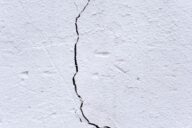Water is powerful and devastating. In fact, water is one of the most destructive forces in nature, and all of us have it coursing around and through our homes at all times. Though water can’t hurt you or your home when it is properly contained in plumbing, water often sneaks out – and havoc ensues.
Water damage can happen all at once or over the course of decades. If you want to prevent any and all water damage in your home, here are the common causes to look out for:
Toilet Drips
A constantly running toilet could be much more than annoying. Though most of the time a running toilet is caused by an improperly placed flapper – which is an effortless fix – the running could be the result of an inconspicuous leak that is slowly but surely damaging your home. Worse, finding a toilet drip can be difficult because there are so many valves, tubes, and pipes connected to the toilet. Fortunately, once a leak is identified, stopping the leak is relatively inexpensive, unless you have extensive water damage to repair.
Garbage Disposal Floods
When a garbage disposal gets old, it tends to fail catastrophically. If you haven’t replaced your garbage disposal in 10 years or so, you should expect to see more than a few leaks appearing relatively soon. Unfortunately, leaks occur in the body of the disposal, which is housed below your sink in your cabinet. That means you might not notice any real problems until the water and rotten food begins to degrade your cabinets, walls, and floor. The fix is as simple as buying and installing a new garbage disposal, and the trick is doing so before the old disposal breaks.
Washing Machine Ruptures
Your clothes washing machine can fill its entire drum quickly because water lines are under constant pressure – but that pressure can be dangerous. If pipes feeding the washer rupture, the entire room around the washer will flood, and fast. The best solution is to replace your old rubber and PVC lines with braided stainless steel ASAP.
Sump Pump Stops
Most Texas homes with basements contain sump pumps, which remove water that is drained away from homes during rainstorms, appliance failure, and other moist issues. Unfortunately, sump pumps aren’t infallible, and a broken pump at the wrong time will turn your basement into an indoor pool. If you want to know what to do when your basement floods, the answer is work quickly to remove the water and salvage your home and possessions. A better solution is to perform regular maintenance on your sump pump.
AC Soaks
Like toilets, air conditioning units can break every which way, and often they spring leaks that aren’t noticeable until your ceiling caves in. Before the hot weather sets in strong this summer, you should learn how to service your AC – or else hire someone who can do that work inexpensively. The most likely cause of water damage is a cracked overflow pan or a clogged drainage line, but there are other common and significant AC problems to look out for.
Water Heater Leaks
One of the scariest potential sources of water damage is the water heater. Because the water contained in that giant tank is usually near boiling, a calamitous leak could end up severely scalding someone in your household. Slower leaks can occur near the base of the tank, and left unchecked, they will flood an entire room. You might consider purchasing a tankless water heater, which is more expensive initially but more efficient (and less dangerous) overall.
Pipe Freezes
Only a few places in Texas get cold enough for frozen pipes, but around the Panhandle, homeowners do need to be wary of wintertime temperatures. It’s easy to forget about the possibility of pipe freezes during the spring and summer, but long before fall, you should ensure that your pipes are properly insulated against the cold.
Drain Blocks
It isn’t a good idea to leave blockages in your drains. Standing water created in stopped up tubs and sinks can seep out and cause damage in hard-to-reach places. Fortunately, blockages are the easiest problem on this list to fix; all you need is clog-busting liquid or a drain snake, at worst.










